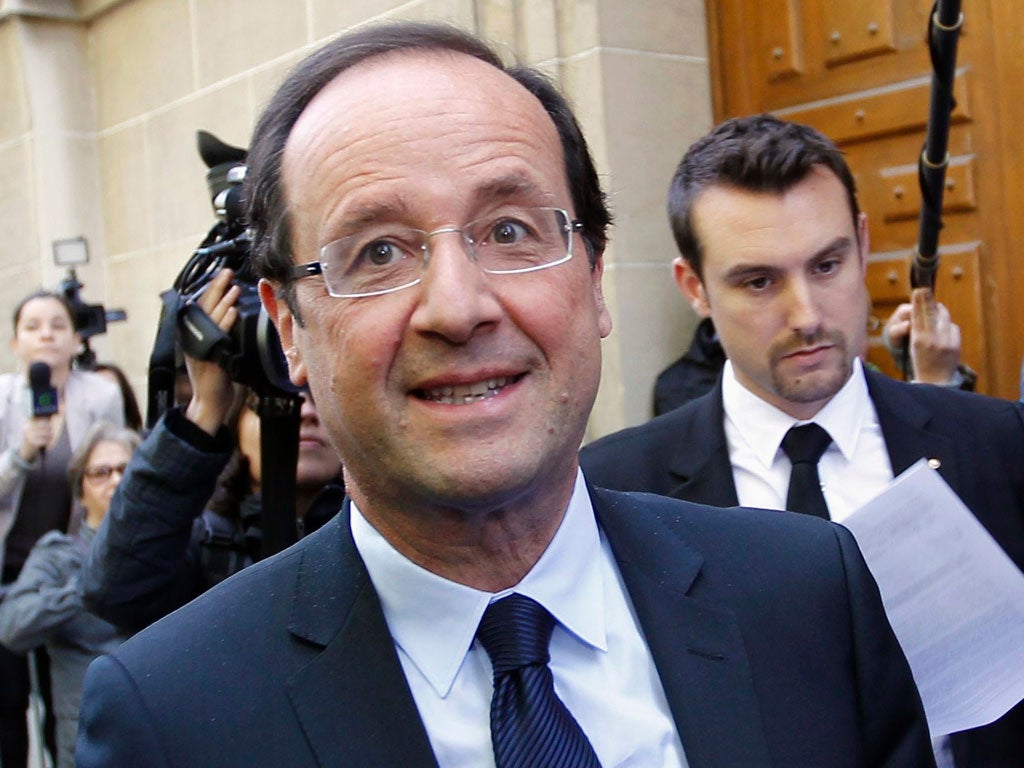First meeting between François Hollande and Angela Merkel to be 'cautious, polite and friendly'

Your support helps us to tell the story
From reproductive rights to climate change to Big Tech, The Independent is on the ground when the story is developing. Whether it's investigating the financials of Elon Musk's pro-Trump PAC or producing our latest documentary, 'The A Word', which shines a light on the American women fighting for reproductive rights, we know how important it is to parse out the facts from the messaging.
At such a critical moment in US history, we need reporters on the ground. Your donation allows us to keep sending journalists to speak to both sides of the story.
The Independent is trusted by Americans across the entire political spectrum. And unlike many other quality news outlets, we choose not to lock Americans out of our reporting and analysis with paywalls. We believe quality journalism should be available to everyone, paid for by those who can afford it.
Your support makes all the difference.Anyone, especially anyone in Greece, hoping for a Franco-German showdown over “growth” when François Hollande meets Angela Merkel today will be disappointed.
The first encounter between the newly installed French president – his in-tray already overflowing despite his inauguration coming only today - and the German chancellor will be cautious, polite and ostentatiously friendly. Within hours of Mr Hollande’s inauguration, the two leaders will spar, without coming to blows, on the new French leader’s plans to rekindle “growth” and “hope” in the European Union.
Far more significant, in the short term, will be Mr Hollande’s first public comments on the Greek crisis at their joint press conference in Berlin this evening. Will the new French president signal, as some in Athens hope, an end to the old “Merkozy” hard-cop-hard-cop, double act on the harsh conditions of the bailout for Greece?
The answer is almost certainly “no”. On his first day in office, Mr Hollande will seek to prove to Ms Merkel and the markets that – to quote his words when he arrived at London St Pancras station on 29 February – “I am not dangerous”.
Mr Hollande, who will be installed in a solemn ceremony at the Elysee (acute on middle e) Palace this morning, is an opponent of the “all-austerity” approach to solving the European debt crisis. That does not mean that he approves a softening of the Greek bail-out terms, which would lead to “me too” demands from Ireland and Portugal and to a market debacle for the Euro.
The new French president apparently agreed in his informal meetings with EU chiefs last week that Greek people cannot have their baklava cake and eat it. In other words, that they cannot stay in the euro while abandoning attempts to restore Greece’s chaotic state finances.
Mr Hollande is anxious that his policies and those of the radical, anti-austerity Left in Greece should not be muddled. The fact that the French and Greek elections occurred on the same day has already led to confusion in the international media, according to the Hollande camp.
Alexis Tsipras, the virulently anti-austerity leader of the radical left Greek party, Syriza, asked to meet Mr Hollande last week. The French president-elect refused.
Mr Hollande sees himself as an apostle of “growth” through Keynsian-type infrastructure spending. He does not, however, see himself as a let-it rip advocate of swollen public budgets and deficit-spending.
Despite the poor forecasts from Brussels last week on the French and European economic outlook, Mr Hollande remains committed to reducing the French deficit to 3 per cent of GDP next year and to zero by 2017.
On the question of Mr Hollande’s ideas for kick-starting growth, he and the Chancellor remain divided but perhaps not quite so divided as they seem. Ms Merkel’s refusal to “reopen” the EU fiscal discipline treaty can be circumvented by agreeing a second text on “growth”.
In its own proposals last Friday, Berlin moved cautiously towards Hollande-type ideas for multi-billion euro, EU-wide infrastructure programmes financed by an expanded budget for the European Investment Bank
Join our commenting forum
Join thought-provoking conversations, follow other Independent readers and see their replies
Comments